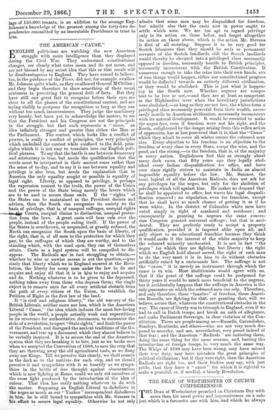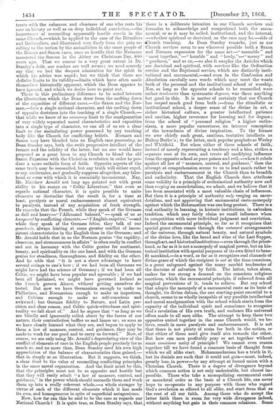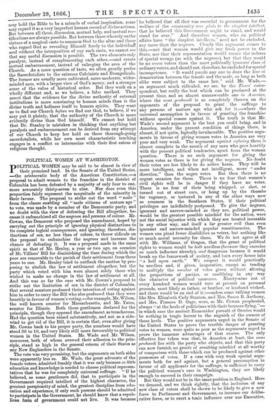THE DEAN OF WESTMINSTER ON CHURCH COMPREHENSION.
THE Dean of Westminster preached on Christmas Day with 1. more than his usual power and impressiveness on a sub- ject which is a favourite one with him, and which he always treats with the calmness and clearness of one who rests his case on history as well as on deep individual conviction,—the importance of reconciling apparently hostile creeds in the same Church,—which he applied to the case of the Ritualists and Rationalists, and illustrated very finely from the gain re- sulting to the nation by the assimilation in the same people of the Roman and Saxon races, once so- hostile that the Normans massacred the Saxons in the Abbey on Christmas Day, SOO years ago. That we concur to a very great extent in Dr. Stanley's drift, our readers are well aware ; we need scarcely say that we feel the deepest admiration for the spirit in which his advice was urged ; but we think that there are definite limits to its validity—limits which have often made themselves historically apparent, which the Dean appears to have ignored, and which we desire here to point out. There is this preliminary difference to be noted between the illustration which the Dean drew from the melting down of the capacities of different races,—the Saxon and the Nor- man,—into a single national character, and the melting down of opposite doctrines into the teaching of a single Church,— that while we know of no nece,ssary limit to the amalgamation of very widely separated moral characteristics and capacities into a single type of character, we can all of us see a clear limit to the assimilating power possessed by any teaching body like the Church for conflicting beliefs. Norman and Saxon may have blended into an English race possessing, as Dean Stanley says, both the swift progressive intellect of the former and the solidity of the latter, but no one would have proposed as a great boon to any Church to blend the old Saxon Paganism with the Christian revelation in order to pro- duce a more catholic form of faith. Opposite aspects of the same truth may be reconciled, but any truth will either expel, or sap, undermine, and gradually suppress altogether, any false- hood or error with which it is essentially inconsistent. Nay, Mr. Matthew Arnold not long ago pointed out with great ability in his essays on "Celtic Literature," that even as regards national character, it is quite possible to unite elements so dissimilar that the result is, for a time at least, paralysis or moral embarrassment almost equivalent to paralysis, instead of any acquisition of fresh strength. He remarks that the French, while they speak of the German as dull and heavy—" l'Allemand balourd," — speak of us as hampered by conflicting elements,—"l'Anglais empetre,"—and while they speak of the German Utise, they talk of our gaucherie, always hinting at some greater conflict of incon- sistent characteristics in the English than in the German; and Mr. Arnold holds that in us the Norman genius "for rapidity, clearness, and strenuousness in affairs" is often really in conflict and not in harmony with the Celtic genius for sentiment, beauty, and spirituality on the one hand, and with the German genius for steadiness, thoroughness, and fidelity on the other. And he adds that "it is not a sheer advantage to have several strings to one's bow ; if we had been all Germans we might have had the science of Germany ; if we had been all Celtic, we might have been popular and agreeable ; if we had been all Latinized, we might have governed Ireland as the French govern Alsace, without• getting ourselves de- tested. But now we have Germanism enough to make us Philistines, and Normanism enough to make us imperious, and Celtism enough to make us self-conscious and awkward ; but German fidelity to Nature, and Latin pre- cision and clear reason, and Celtic quick-wittedness and spiri- tuality we fall short of." And he argues that "so long as we are blindly and ignorantly rolled about by the forces of our nature, their contradiction baffles us and lames us ; so soon as we have clearly learned what they are, and begun to apply to them a law of measure, control, and guidance, they may be made to work for our good and to carry us forward." Now, of course, we are only using Mr. Arnold's depreciating view of the conflict of elements of race in the English people precisely for as much as, and no more than, Dean Stanley used his own high appreciation of the balance of characteristics thus gained,— that is, simply as an illustration. But it suggests, we think, a clear limit to the value of reconciling conflicting principles in the same moral organization. And the limit must be this, that the principles must not be so opposite and hostile but that they will easily admit "a law of measure, control, and guidance," in the power which should reconcile, hem and work them up into a really coherent whole,—a whole stronger by virtue of each of the different elements which it has made its own, and homogeneous in spite of superficial antagonisms.
Now, how far can this be said to be the case as regards our National Church? It is quite true, as Dean Stanley says, that
! there is a deliberate intention in our Church services and Iformulas to acknowledge and comprehend both the sacra- 1 mental, or as it may be called, institutional, and the internal, ! —whether spiritual or doctrinal, as the case may be,—side of Church teaching. As Dean Stanley remarks, just as our Church services seem to use wherever possible both a Saxon and Norman expression for the same act—" assemble" and "meet together,"—" humble" and " lowly,"—" mercy " and "goodness," and so on,—so also it couples the Articles which, are doctrinal and spiritual, with services like the Ordination service and the Baptismal service, which are distinctly insti- tutional and sacramental,—and even in the Confession and Absolution carefully uses words which may meet the wants both of the personal and the institutional school of worship. Nor, so long as the opposite schools to be reconciled were rather tendencies than systematic dogmas, was there anything but good in this. It is matter of certainty that our Church has reaped much good from both ;—from the ritualistic or institutional school, a deeper sense of the divine in art, a richer historical culture, a greater intellectual patience and caution, higher reverence for learning and for dogma ; from the school of "personal religion" a higher enthu- siasm, a more popular earnestness, an intenser conception of the inwardness of divine inspiration. To the former we owe chiefly such great, cautious, tentative intellects as Bishop Butler's ; to the latter, such popular prophets as Wesley and Whitfield. But when either of these schools of faith,_ instead of merely representing a tendency and a bias, strikes a separate root of its own, and treats all modifying influence from the opposite school as pure poison and evil,—when it rebels- against all law of "measure, control, and guidance," then the attempt at comprehension seems to us to lead much rather to paralysis and embarrassment in the Church than to breadth and catholicity. That the English Church does attribute some validity to a principle of ecclesiastical authority now and then verging on sacerdotalism, we admit, and we believe that it has been associated with a most valuable chain of influences. But then it is a principle of authority only verging on sacer-- dotalism, and not approving that sacramental caste-monopoly' against which the Reformation was one long protest. There is a- real authority in learning, in historic institutions, in unbroken. tradition, which may fairly claim no small influence when in competition with mere individual judgment and conviction. Indeed the sacramental principle, so far as it recognizes that special grace often comes through the outward arrangements:. of the universe, through natural beauty, and natural symbols. of the divine love, like the bread and wine of the Last Supper, through art, and historicalinstitutions—even through the priest- hood, so far as it is not a monopoly of magical power, but an his- torical institution with special purposes of its own fitted to bene- fit mankind,—in a word, so far as it recognizes real channels of divine grace of which the recipient is not at the time conscious, is a great safeguard against the many morbid tendencies of the doctrine of salvation by faith. The latter, taken alone, makes far too strong a demand on the conscious religious emotions, which the sacramental principle, if relieved from all magical perversions of it, tends to relieve. But any school that adopts the monopoly of a sacramental caste as its basis of thought, its divine datum, the one starting-point essential to a church, seems to us wholly incapable of any possible intellectual and moral amalgamation with the school which starts from the' capacity of the individual spirit and conscience to recognize' God's revelation of His own truth, and embrace His universal offers made to all men alike. The attempt to keep these two- opposites united together in the same Church would, we be- lieve, result in mere paralysis and embarrassment. It is not- that there is not plenty of room for both in the nation, or that either of them need give itself airs towards the other. But how can men profitably pray or act together without- some conscious unity of principle ? We cannot even reason together till we have found a common basis of thought from_ which we all alike start. Mohammedanism has a truth in it, but its denials are such that it could not gain—must, indeed, greatly lose, in power—by any attempt at forced union with a. Christian Church. There is a degree of divergence beyond which common action is not only undesirable, but almost im- possible. Those who take a monopolizing sacramental caste or sacerdotal order as the basis of a Church life, can never' hope to co-operate to any purpose with those who regard God's revelation as offered to all alike, and start from that as the root of all our faith. Among those who do accept the latter faith there is room for very wide divergence indeed, without anything but gain in their common relations. Some
































 Previous page
Previous page